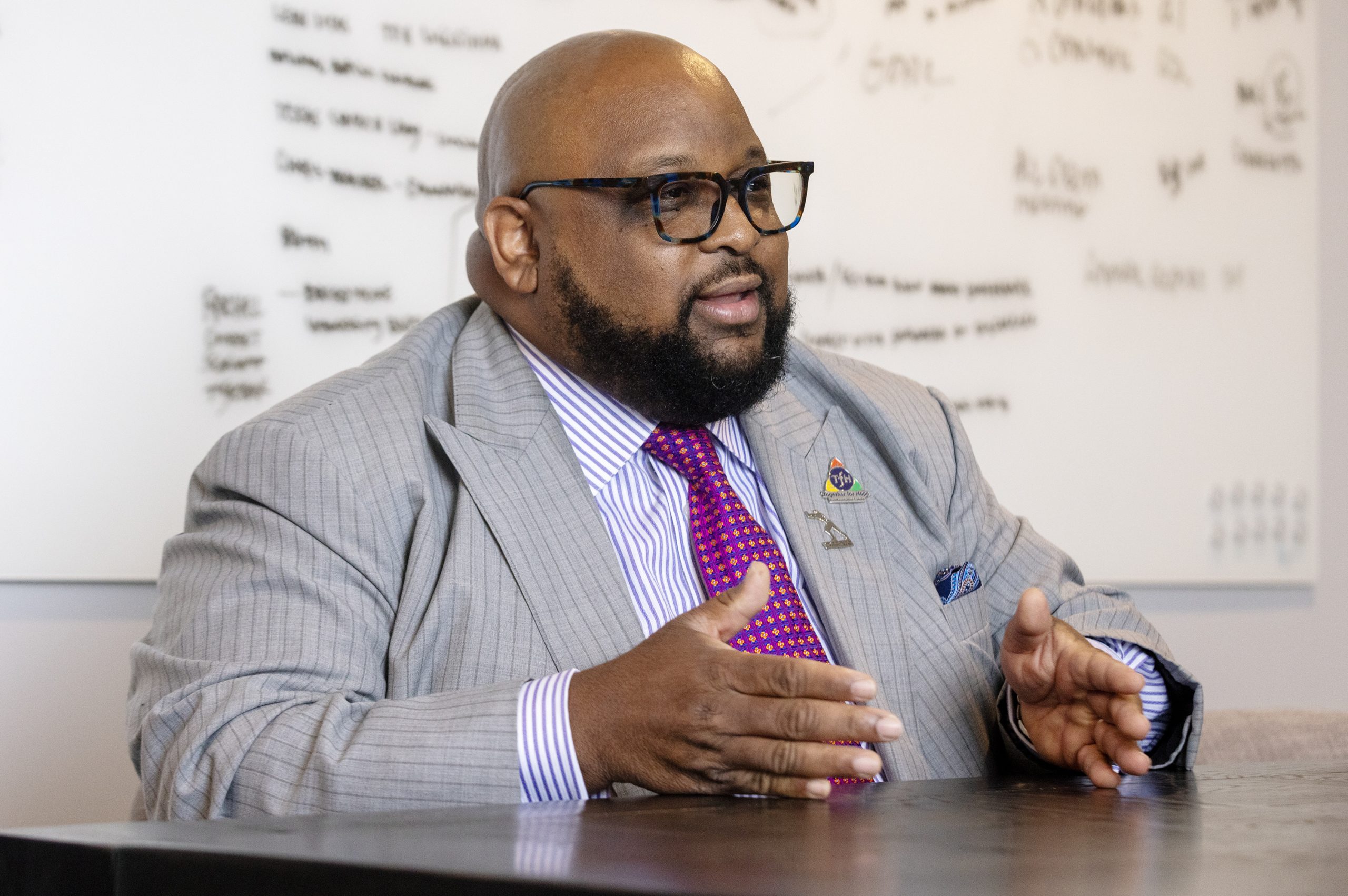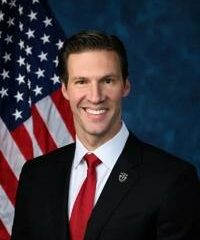Mississippi Today
Q&A: Rev. Charlton Johnson on seeing Medicaid expansion not as a financial issue, but a moral necessity

Rev. Charlton Johnson only joined Together for Hope as leader of its Delta region in September, but he began thinking about Medicaid expansion long before that.
Together for Hope, an organization that works with people in the poorest counties in the country, has ramped up its efforts advocating for Medicaid expansion in Mississippi. The nonprofit hosts summits all over the states to bring together faith leaders, medical experts and health care advocates to raise awareness about Medicaid expansion. The policy, which would provide health insurance for an additional 200,000 to 300,000 Mississippians, would greatly improve health care access for the communities they work with, according to the organization.
But Gov. Tate Reeves remains steadfast in his opposition, despite support from a majority of Mississippians, and has derisively referred to Medicaid expansion as adding more people to “welfare rolls.”
Mississippi is one of only 10 states that has not expanded Medicaid. Over its first few years of implementation, research shows expansion would bring in billions of dollars to Mississippi and help the state’s struggling hospitals.
Johnson, who was born in Greenville and who has worked as a chaplain for hospitals in Memphis and Jackson, acknowledges its financial benefits. But expansion is about more than that, according to Johnson — it’s really about helping your neighbor.
Johnson spoke with Mississippi Today about the need for Medicaid expansion, and what the Governor’s refusal to consider the policy says about morality in Mississippi.
This interview has been edited for clarity and length.
Mississippi Today: Talk to me a little bit about what Together for Hope is and what it does for people who have not heard of it.
Rev. Charlton Johnson: It is a coalition with its focus on fighting rural, persistent poverty. Persistent poverty is defined as an area that has been under the federal threshold for poverty for consistently 30 years, and in Mississippi alone, we have 53 counties that meet that definition of persistent poverty. We are a national group, so I’m serving what we call the Delta region, which comprises the poorest counties in Mississippi, in Arkansas and Missouri; some parishes in Louisiana; Illinois — basically along the Mississippi River.
MT: Can you explain a little more in detail what the organization does, specifically?
Johnson: We serve as a bridge for grassroots organizations and what we call grass-top organizations that are trying to find ways to make an impact on the ground. For instance, there is this group that we partner with out of the Delta called Hands for Hope. They have tried to intervene with the food scarcity in that area because they don’t have a lot of grocery stores and fresh foods. Most people do their grocery shopping at Family Dollar or Dollar General. Now, they have a space where they receive fresh foods, like a distribution. Our job is making that connection between the community and that organization. A lot of grassroots organizations have a mission or idea of how they want to help the community, but they don’t always have the resources to turn something around.
MT: What kind of work does Together for Hope do around Medicaid expansion?
Johnson: It’s largely advocacy, with hosting the summit. Expansion has not been framed the right way. That was even mentioned in our last staff meeting, that we almost need to just pull it back from saying Medicaid expansion versus just starting to meet those who are in the gap. There are so many people who are in that void of not being able to receive health care.
As a chaplain in hospitals, I’ve seen people use the emergency room as their primary care physicians, or they can’t go to the doctor and get sick enough they end up in the ER. That’s because people don’t have insurance. Seeing that was an awakening moment for me — it was when I began to recognize that people are not just running in here because they’re sick. It’s because the hospital has become their only option.
MT: I’m sure you were hearing about expansion long before starting this job. How do you think we have been talking about expansion, and how do you think we should be talking about it?
Johnson: Before coming into this role, I heard conversations about the need to expand Medicaid, which came while President Obama was in office. But there was so much resistance from red states to support that kind of initiative. People were trying to do their best to tear it apart. And Mississippi, of course, being the red state that it has long been, did not accept monies to help make this program more robust in Mississippi. So to hear Governor Reeves saying that he still isn’t interested in expanding Medicaid, to me it is just continuing the talking point that I heard from people who share his political ideology. When I heard that this organization Together for Hope was out there trying to help people better understand how it helps, not just people but the community as a whole and to also fight poverty, I wanted to be on the front lines.
MT: I’m wondering how you, as a pastor, square red states that are really religious with this resistance to helping some of the most vulnerable people in the state?
Johnson: I have a hard time. As a person of faith, it’s so hypocritical to me, because when you look at the 10 commandments, Jesus teaches that all of those commandments can be boiled down to two. The first is loving God, but the second one is loving your neighbor as yourself. And if I love my neighbor, then I recognize that we have a mutual interest in each other doing well.
That’s not something that I readily see in a hospitality state like Mississippi. So that’s hard for me to square for myself personally, but I also recognize that we’re all at different places in our walk of faith. I think if you’re Christian, you walk the walk of Christ long enough at some point, it changes your heart, and it begins to alter the way you see those around you, so I have hope that one day they’ll see that change.
But until that day, it just means that those of us who do see the need for change, need to not only be vocal, but need to be out front with doing those acts of compassion, of grace and mercy.
MT: If you were to explain what Medicaid expansion is to someone who wasn’t familiar with it, or someone who opposes it, what would you say about the policy and its significance?
Johnson: I’ve been holding on to a passage in Psalms 23 which says that “though I walk through the valley of the shadow of death, I will fear no evil: for thou art with me.” It’s not that we don’t have something to fear, but Christ is with us. Christ is with the hurting. And to say that we are Christ’s followers means that we need to follow Christ to where those who are hurting to help, to offer grace, to offer support.
And I see access to health care as a means of offering grace to people, or expanding Medicaid, bridging the gap — whatever phrase people want to put to it.
MT: Together for Hope advocates for expansion because of their work in communities of poverty, as I understand it, so can you talk a little bit about the connection between poverty and poor health outcomes?
Johnson: If people are not getting the medical care they need, the health disparities are going off the charts. People are dying unnecessarily because they don’t even have the option of going to the doctor when they need it. When they get sick, they have to just muster through it and hope that they’ll be okay. And I don’t think that’s what it means to live in a community.
MT: If Mississippi continues to forgo expansion, what are the consequences for the communities you work with?
Johnson: Those health outcomes will continue to get worse and worse is the short answer. But I don’t think that robs compassionate people of ingenuity. We’re going to find a way to help people.
Expansion seems the most logical way that it can be done, but if we have to find an I’ll-climb-the-mountain-side way of helping people with health care access, we will.
This article first appeared on Mississippi Today and is republished here under a Creative Commons license.
Mississippi Today
Program helps students with disabilities forge paths to careers
‘I wouldn’t have found them otherwise’: Program helps students with disabilities forge paths to careers
Matthew Devers, 18, describes his current job as “very brute force.” He’s in a welding program, working part time while completing his associates degree at Mississippi Gulf Coast Community College.
He says it wouldn’t have been possible without the pre-employment training and services program he joined after high school. Pre-ETS is a program that provides students with disabilities education and experience to help them enter post-secondary education and/or the workforce. Devers, who is autistic, says “I wouldn’t have found them otherwise.”
People with disabilities make up 13% of the country’s population as of 2024. The employment rate for people with disabilities is lower than for people without. According to the Bureau of Labor Statistics, the 2024 employment-population ratio for disabled people between 16 to 24 years old is 37.4%. By comparison, the employment rate for non-disabled people is 65.8%.
Pre-ETS provides job exploration and counseling, work-based learning experiences, counseling opportunities for enrollment in comprehensive transition or postsecondary education programs, workplace readiness training, and instruction in self-advocacy.
In 2014, Congress amended The Rehabilitation Act of 1973 through the Workforce Innovation and Opportunity Act, expanding the population of students with disabilities that vocational rehabilitation agencies may serve. This gave birth to the pre-ETS program, which is funded by state vocational rehabilitation agencies.
Nationally, pre-ETS services are underutilized. The Hechinger Report found that in 2023, 295,000 students were using pre-ETS when it’s estimated that 3.1 million were eligible. Often, the report found, parents are even aware it exists.
The Office of Vocational Rehabilitation is currently serving 3,382 students, 2,053 of whom are in the pre-ETS program. How many it could potentially serve isn’t known, but the Mississippi Department of Education said there are 20,994 students between the ages of 14 and 21 in special education. That’s the age group pre-ETS serves.
If aware of pre-ETS, families can request thatfor their child to join the program through a school counselor or school transition staff. If the student doesn’t have an open vocational rehabilitation case, they can reach out to a local VR transition counselor or vocational rehabilitation for the blind counselor.
Jennifer Jackson, the executive director of the Office of Vocational Rehabilitation, said she is optimistic about the direction of pre-ETS in Mississippi. “I feel like our state is constantly improving and constantly seeking out ways to help these individuals be successful,” she said.
The recent cost-cutting measures from the Trump administration have alarmed some disability rights advocates. As part of its sweeping cost-cutting spree, the Department of Government Efficiency, or DOGE, canceled at least two grants researching school-to-work transition services for youth with disabilities, including two multimillion-dollar contracts for studies on outcomes for students with disabilities after high school graduation.
“While we are aware that staffing changes have taken place within the Department of Education (DE), where RSA is housed, we have not been informed of any direct impact to Vocational Rehabilitation (VR) funding at this time,” Jackson said in a statement. RSA refers to the Rehabilitation Services Administration.
Jackson said these services provide essential help for young people with disabilities who often struggle learning skills that people are not disabled can take for granted. She said they’re also key for improving employment outcomes for people with disabilities.

To be eligible, a student must: be between ages 14 to 21; have a documented disability, 504 plan to ensure the child receives accommodations and access to the learning environment; or Individualized Education Program plan; and be enrolled in a recognized educational program. Applicants must complete a Pre-ETS Referral Form, have a parent or guardian sign a release of information, and have a copy of the student’s documented disability, 504 plan, or IEP plan.
OVR partners with 13 organizations and nonprofits across Mississippi to deliver pre-ETS programs. One of them is the Transition to Adulthood Center on Learning, the same program Devers was in. The center is part of the Institute for Disability Studies at the University of Southern Mississippi.
Beth Robertson, the center’s executive coordinator for transition, described the program as a collaboration between families, schools and state agencies. “We can always work together even more, increase our involvement more, we would love to see that,” she said.
This article first appeared on Mississippi Today and is republished here under a Creative Commons Attribution-NoDerivatives 4.0 International License.![]()
Mississippi Today
Government secrecy tends to bite Mississippi in the butt. It’s happened again
The state Senate Republican leadership didn’t plan to fail on a Mississippi tax overhaul. It failed to plan.
And when pressed late in the 2025 legislative session to come up with a proposal to counter the House Republican leadership’s sweeping bill, Senate leaders did so behind closed doors and hurriedly.
The result: a majority of legislators passing a tax overhaul bill full of math errors that accidentally did what Senate leaders didn’t want. And it stripped out safeguards for taxpayers that both the House and Senate leadership said were prudent.
No matter how much Gov. Tate Reeves praises House Bill 1 as “one big, beautiful bill,” borrowing a phrase from President Trump as he signed it into law, it was passed through secrecy, subterfuge and error, not representative democracy.
Had the Senate perhaps taken a little more time, allowed more input from and access to its strategizing from rank-and-file lawmakers, and who knows, maybe even a little crowd-sourcing allowing the public to scrutinize the bill before passing it, maybe the blunder could have been prevented.
READ MORE: OOPS! Senate sent House an income tax bill with typos. House ran with it. What’s next?
And while House leaders should receive praise for coming up with an initial public-facing tax overhaul plan through months of public hearings and forums, that’s not what was passed into law. House leaders played a game of secret squirrel to pass the Senate’s mistakes into law. Then instead of negotiating in good faith to fix the problems, House leaders tried to shanghai the Senate in backroom negotiations to pass a few plums they wanted, such as legalized online sports betting and a sales tax increase.
The end result: Historically bitter infighting among state GOP leaders to the point they couldn’t even pass a state budget, their main job. And we have communications between Mississippi’s top legislative leaders and governor, all Republicans, that these days are often reduced to mean tweets or Facebook posts about each other, not earnest negotiations.
READ MORE: The Typo Tax Swap Act of 2025 may be the most Mississippi thing ever
Mississippi government’s default setting is secrecy, from public records and meetings to access to elected officials, and it has never served our citizens well. From a black-ops agency that spied on its citizens for nearly two decades to festering, generational government corruption that has cost taxpayers hundreds of millions of dollars, secrecy is neither good politics nor good policy.
Major, sweeping state policy should be conducted in the open and with public input. But as the national and world economies plunge into turmoil that is sure to impact Mississippi, our new tax code lacks safeguards that both House and Senate leaders said were needed — all because of secrecy and lack of planning and communication.
This article first appeared on Mississippi Today and is republished here under a Creative Commons Attribution-NoDerivatives 4.0 International License.
Mississippi Today
Ward 6 council candidates face the image of south Jackson versus the reality
Driving down roads in south Jackson in recent weeks, residents were inundated with placards of smiling faces and names in bright, bold fonts of people hoping to be the next Ward 6 councilman.
In some neighborhoods, the streets were as littered with campaign signs as they are overgrown lots and abandoned properties in between neatly kept homes.
“The homes in the surrounding area and businesses in Ward 6 have been decimated. It looks like a bomb went off,” said Sylvia Walker, Ward 6 board member for the Jackson Association of Neighborhoods. “We’ve seen the businesses hollow out and nothing come back in. It’s disheartening. It’s sad.”
Walker said the image of south Jackson must be interrogated. Not enough people are talking about the good happening in Ward 6, she said.
“South Jackson is very diverse and not just one specific area,” said Walker. “I think the biggest misconception is that south Jackson is just full of dilapidated homes, and the people are poverty-stricken and destitute, and that’s not true.”
Ward 6 has the largest population of Jacksonians, with just over 23,000 people. It also has the highest number of Black residents, according to data from the City of Jackson’s website.
Jackson also has a high number of abandoned properties owned by the state. According to data from the Secretary of State’s office, there are about 1,900 tax-forfeited properties in the City of Jackson.
There will be a Democratic runoff on April 22 between two candidates for the Ward 6 city council seat. Emon Thompson Sr. garnered 714 votes and Lashia Brown-Thomas came in second with 652 votes. Voter turnout was low, with less than 3,200 votes cast in a ward with a voting age population of more than 16,000. There were nine contenders for the coveted council seat, more than any other council race.
Candidates for the coveted Ward 6 seat envision a more beautiful, thriving south Jackson. After a stacked primary, two candidates have made it to the runoff to replace Aaron Banks, former council person who faces criminal charges for allegedly accepting cash bribes in exchange for his vote on a development project. He pleaded not guilty.
Banks is familiar with the image problem in south Jackson. He said he’s made progress with more demolitions and landscaping work done than others in the past. This includes the demolition of Casa Grande Apartments and Appleridge Shopping Center.
“I’ve always said that I would serve two terms, and we got a lot of work done,” Banks said in a recent interview with Mississippi Today.
Brown-Thomas said that crime and blight are the biggest issues affecting Ward 6. The law enforcement officer wants to hold people accountable for their part in the perceived image of a decaying south Jackson.
“The city has codes, and if these people are not holding up to the codes, they need whatever punishment there is,” Brown-Thomas said. “If they aren’t holding the property up, then they should not have the property.”
She said that if she’s elected, she’ll work to get police officers higher wages, and will remain transparent and available to constituents.
“It’s not going to happen overnight, but it will take some time,” Brown-Thomas said. “I’m not saying it’s going to come in a year, not even two years, but we have to address the issues first, then everything else will fall in line.”

Thompson Sr., a business owner and retired veteran, said that a lot of the issues with blight comes down to enforcement.
“We need to, first of all, clean up our blighted properties by using the laws that we already have,” Thompson said. “The city already has ordinances with enough teeth to deal with blight.”
South Jackson voters don’t turn out like they should, he said, which can lead to a distrust in the system. He hopes, if elected, to be able to reach constituents where they are and keep them a part of the process in restoring their communities, like water improvement or curbing crime.
“Out of the 40 something thousand people that’s in south Jackson, maybe 3,900 people vote in the municipal elections,” he said. “They don’t have faith in the government anymore.”
“…If there’s a reason why we’re not getting any services out here, then I want to make sure I communicate that with a constituent so they can continue to have hope,” he said.
Representative Ronnie Crudup, Jr., D-Jackson, said that residents’ migration out of Jackson creates bigger issues for communities.
“To me, blight is just a symptom of a larger problem. The people are leaving the city of Jackson, and the population is decreasing,” Crudup said. “When people leave the properties, you end up with squatters and vagrants who move into these properties and tear them up.”
Crudup has been renovating and demolishing blighted properties in south and west Jackson for nearly eight years. So far, he said he’s renovated about 35 homes.
“Even though we are demoing and tearing down one or two properties, when people leave, that leaves other ones there,” he said. “You got all these blighted properties all around south and west Jackson, and some even in parts of north Jackson now, because people are leaving.”
He said the one thing that’s needed most: more funding from all levels of government for blight mitigation work.
“There needs to be more money from the legislature, but there needs to be more money allocated from the city council too,” Crudup said. “I think the city is going to have to take clean up efforts to a higher circumstance, and let the legislature see that they’re serious about this, and also get the county involved and let them know ‘Hey, we need all the help we can get.’”
And, the perception that city leaders have abandoned south Jackson is not necessarily right. Former Jackson Mayor Harvey Johnson said that blight is an issue that affects not only south Jackson but all parts of the city. Mitigating blight is going to take an intergovernmental approach, he said.
“I know that in some cases, some people feel they’ve been sort of abandoned, but I don’t think that’s the case,” Johnson said. “It may be a lack of resources to attack the problem and it’s going to require all governments to work together.”
Walker said she remembers when the city’s southern boundary changed and her neighborhood, which had been part of Byram, came inside Jackson city limits. A small portion of her ward was annexed by the city of Jackson in 2006 as part of Byram’s reincorporation. In the last couple of decades, she said she’s seen people be forced out of their homes due to the recession. Others simply chose to leave.
“We’ve had a turnover, but the neighborhood is still relatively stable,” Walker said. “When we moved in, a lot of people moved out.”
Walker said that while her neighborhood isn’t struck by blight, she sees abandoned properties while making her way through the community and near her church.
When thinking of a candidate that she would want to vote for, Walker said she’s looking for a good communicator who can be an advocate for the ward.
“We need someone that’s forward thinking. Someone that has the best interests of the residents of south Jackson and an understanding of the vast diversity of the ward,” she said. “Someone that’s able to work with other members of the City Council. Someone able to work with our board of supervisors and state legislators to find solutions to some of these issues.”
Banks said that his greatest achievement as city councilman was hosting quarterly town hall meetings to inform his constituents on the importance of ordinances and legislation created to better their lives.
“There’s one piece of legislation that deals with overhanging tree limbs and limbs. That idea came from a constituent,” he said. “When you see constituents being able to give informed ideas on legislation, which is the job of a council member, I think that’s an achievement because then what that says is there’s involvement in the process.”
“I hope the next person will understand that communicating with the people is key, and that the people of Ward 6 are resilient,” Banks said. “As long as they continue to communicate and stay in the scope of their job and work with the administration, there’s a lot that can be done.”
This article first appeared on Mississippi Today and is republished here under a Creative Commons Attribution-NoDerivatives 4.0 International License.![]()
-

 The Center Square7 days ago
The Center Square7 days agoCA fails audit of federal programs, 66% of COVID unemployment benefits in question | California
-

 News from the South - Alabama News Feed6 days ago
News from the South - Alabama News Feed6 days ago‘Hands Off!’ Protest Held in Huntsville Saturday | April 5, 2025 | News 19 @ 9 P.M.
-

 News from the South - Florida News Feed7 days ago
News from the South - Florida News Feed7 days agoFlorida student accused of punching deputy in the face
-

 News from the South - North Carolina News Feed7 days ago
News from the South - North Carolina News Feed7 days agoState appeals court finds merit in protests of nation’s last unsettled election | North Carolina
-

 News from the South - Florida News Feed7 days ago
News from the South - Florida News Feed7 days agoSouth Florida dad shares update on daughter severely burned in Molotov cocktail attack
-

 Mississippi Today7 days ago
Mississippi Today7 days agoMeet Willye B. White: A Mississippian we should all celebrate
-

 News from the South - Alabama News Feed6 days ago
News from the South - Alabama News Feed6 days agoFour people rescued, two taken to hospital after Birmingham apartment fire
-

 News from the South - North Carolina News Feed5 days ago
News from the South - North Carolina News Feed5 days agoProposal: American military base retailers would exclude 4 hostile nations | North Carolina











































